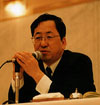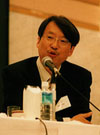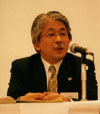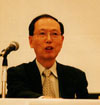GLOCOM Forum: Japan's Revival-Beyond the Clash of Civilizations
Discussion Summary Part 2: Freedom and Rules of Internet Communications
English summary of the panel discussion in Session 2 at GLOCOM's 10th anniversary forum on November 19, 2001
Panelists:
Koichiro Hayashi (Professor, Keio University, and Senior Research Fellow, GLOCOM)
Shigenori Matsui (Professor, Osaka University)
Jiro Makino (Lawyer, and Representative, the Association of Internet Lawyers)
Moderator:
Tomomi Tsubota (Nihon Keizai Shinbun)
|
 TSUBOTA: Now that Professor Hayashi has made his presentation (see Koichiro Hayashi, "Freedom and Minimum Rules of Internet Communications: Beyond an "Integrated Telecommunications-Broadcasting Act") Professor Matsui would you comment on the Hayashi thesis, please. TSUBOTA: Now that Professor Hayashi has made his presentation (see Koichiro Hayashi, "Freedom and Minimum Rules of Internet Communications: Beyond an "Integrated Telecommunications-Broadcasting Act") Professor Matsui would you comment on the Hayashi thesis, please.
|
|
 MATSUI: As a student of the Constitution, I have a number of comments on Professor Hayashi's ambitious proposal. Although I understand Professor Hayashi's basic views, I believe that we had better not have a comprehensive law as suggested by Professor Hayashi. The first thing to do is to review and revise existing laws regarding broadcasting and telecommunications in accordance with the Internet age. The concept of protecting the freedom of the Internet by law itself is not bad, but I doubt if we need to regulate the Internet by a comprehensive law. For enactment of such a law could lead to harmful regulations. Although it is often said that broadcasting and telecommunications are conversing with each other, "broadcasting" is a very special concept in the Japanese legal context; that is, broadcasting is defined as a means of communications through radio waves for reception by the general public. This definition is thus media-dependent and the scarcity of radio wave spectrum has justified regulations on broadcasting. This definition is rather unique in Japan compared to other countries. Thus, there is some danger to carry over content regulations on broadcasting to other means of communications such as the Internet if a comprehensive law is constructed on the basis of broadcasting. In fact, regulations on broadcasting are applied to CATV contents even though CATV uses cables and not radio waves. So we need to reconsider the concept and definition of broadcasting and we should separate the Internet from broadcasting. While it may be important to secure freedom of any media by law, the question is why the Internet should be singled out among various alternative means of communications. As far as content regulations are concerned, I prefer a kind of "patchwork approach" to have minimum required legal arrangements as necessary, rather than introducing comprehensive regulations, leaving Internet activities for market competition as much as possible in order to promote public interests. For example, in the United States, the government has largely taken a policy of not regulating the Internet. Japan can learn from such an approach in order to facilitate the development of the Internet. MATSUI: As a student of the Constitution, I have a number of comments on Professor Hayashi's ambitious proposal. Although I understand Professor Hayashi's basic views, I believe that we had better not have a comprehensive law as suggested by Professor Hayashi. The first thing to do is to review and revise existing laws regarding broadcasting and telecommunications in accordance with the Internet age. The concept of protecting the freedom of the Internet by law itself is not bad, but I doubt if we need to regulate the Internet by a comprehensive law. For enactment of such a law could lead to harmful regulations. Although it is often said that broadcasting and telecommunications are conversing with each other, "broadcasting" is a very special concept in the Japanese legal context; that is, broadcasting is defined as a means of communications through radio waves for reception by the general public. This definition is thus media-dependent and the scarcity of radio wave spectrum has justified regulations on broadcasting. This definition is rather unique in Japan compared to other countries. Thus, there is some danger to carry over content regulations on broadcasting to other means of communications such as the Internet if a comprehensive law is constructed on the basis of broadcasting. In fact, regulations on broadcasting are applied to CATV contents even though CATV uses cables and not radio waves. So we need to reconsider the concept and definition of broadcasting and we should separate the Internet from broadcasting. While it may be important to secure freedom of any media by law, the question is why the Internet should be singled out among various alternative means of communications. As far as content regulations are concerned, I prefer a kind of "patchwork approach" to have minimum required legal arrangements as necessary, rather than introducing comprehensive regulations, leaving Internet activities for market competition as much as possible in order to promote public interests. For example, in the United States, the government has largely taken a policy of not regulating the Internet. Japan can learn from such an approach in order to facilitate the development of the Internet.
|
|
TSUBOTA: Next, I would like to have some comments from Mr. Jiro Makino, please.
|
|
 MAKINO: Regarding the idea of introducing a comprehensive media act, I basically agree with Professor Hayashi and, therefore, must disagree with Professor Matsui. The reason is that as I have recently been watching a series of legislative actions in the Japanese Diet, I have found it very strange. Important bills have been passing the Diet one after another without much scrutiny by the public. Of course, there are some public comments solicited, but very few comments are made on the Internet and virtually none otherwise. And not much discussion is done among politicians in the Diet and very few lawyers know what is going on in the legislative process. This could be very dangerous, so I would like to encourage the general public to discuss about the overall design of information society in Japan on the basis of a comprehensive media act as proposed by Professor Hayashi. However, with respect to detailed points, I depart from Professor Hayashi. For example, I do not subscribe to the penalty aspects of the Hayashi Act, because damages due to law violations in the case of the Internet depend on the layer and nature of the network in question and values of information vary tremendously among different individuals or organizations. So for the moment I would rather like to see a basic ideal law to point to the right direction without introducing regulations or penalties,. Such a law would be quite useful in searching for practical rules and standards for regulations and penalties in various layers of the Internet. But in any case I commend Professor Hayashi's effort in this regard. MAKINO: Regarding the idea of introducing a comprehensive media act, I basically agree with Professor Hayashi and, therefore, must disagree with Professor Matsui. The reason is that as I have recently been watching a series of legislative actions in the Japanese Diet, I have found it very strange. Important bills have been passing the Diet one after another without much scrutiny by the public. Of course, there are some public comments solicited, but very few comments are made on the Internet and virtually none otherwise. And not much discussion is done among politicians in the Diet and very few lawyers know what is going on in the legislative process. This could be very dangerous, so I would like to encourage the general public to discuss about the overall design of information society in Japan on the basis of a comprehensive media act as proposed by Professor Hayashi. However, with respect to detailed points, I depart from Professor Hayashi. For example, I do not subscribe to the penalty aspects of the Hayashi Act, because damages due to law violations in the case of the Internet depend on the layer and nature of the network in question and values of information vary tremendously among different individuals or organizations. So for the moment I would rather like to see a basic ideal law to point to the right direction without introducing regulations or penalties,. Such a law would be quite useful in searching for practical rules and standards for regulations and penalties in various layers of the Internet. But in any case I commend Professor Hayashi's effort in this regard.
|
|
TSUBOTA: Professor Hayashi, do you have any rejoinder to the comments of Professor Matsui and Mr. Makino at this point?
|
|
 HAYASHI: I have to accept all the criticisms against my proposal, since it is still premature and incomplete in various respects. This kind of task should have been done by bureaucrats and is just too much for a scholar like myself to handle alone. I am doing this simply because I can learn a lot from this exercise myself. Having said that, I would like to point out to Professor Matsui that although I can see the peculiar problem in Japan associated with the narrow definition of broadcasting, which tends to justify unnecessary regulations on media in general, there are relatively few regulations explicitly introduced in my proposed act. In order to clarify my intention for, and not against, deregulation, however, I will write my future edition by paying more attention to individual rights such as freedom of speech. Regarding Mr. Makino's points, I would be willing to take most of them, but one thing I should question is the meaning of having a basic ideal act just like a constitutional declaration. An act without enforcement in this field may be meaningless in reality and ineffective in penalizing any violations or in repealing any existing laws. I would like to have comments on these points. HAYASHI: I have to accept all the criticisms against my proposal, since it is still premature and incomplete in various respects. This kind of task should have been done by bureaucrats and is just too much for a scholar like myself to handle alone. I am doing this simply because I can learn a lot from this exercise myself. Having said that, I would like to point out to Professor Matsui that although I can see the peculiar problem in Japan associated with the narrow definition of broadcasting, which tends to justify unnecessary regulations on media in general, there are relatively few regulations explicitly introduced in my proposed act. In order to clarify my intention for, and not against, deregulation, however, I will write my future edition by paying more attention to individual rights such as freedom of speech. Regarding Mr. Makino's points, I would be willing to take most of them, but one thing I should question is the meaning of having a basic ideal act just like a constitutional declaration. An act without enforcement in this field may be meaningless in reality and ineffective in penalizing any violations or in repealing any existing laws. I would like to have comments on these points.
|
|
MATSUI: It may be important to declare basic ideas as pointed out by Mr. Makino, but we need to do so under constitutional constraints. A consistent first step would be to reexamine existing media laws in light of the Constitution rather than writing a comprehensive media act. Then I doubt if there is anything specifically left for the Internet.
|
| MAKINO: If Professor Hayashi submits this proposal to the legal bureau in Prime Minister's Office, it would be altered altogether, as we have witnessed so many times in the past. Rather, what we need is a basic ideal law on the side of the general public. If such a law is effectively utilized for progressive movements in the legal process, it might help modify the legal interpretations of existing laws by judges in actual court cases in the right direction and thus fill the gap between new laws and old laws, a point that was raised by Professor Hayashi. Unless basic ideas are made clear to shape the overall scheme, the effort to pass this kind of bill proposed by Professor Hayashi will most likely be resisted and frustrated by various interest groups in Japan.
|
| TSUBOTA: I would like to conclude by asking the audience to think of actual cases at hand regarding the Internet in light of Professor Hayashi's proposed act. We should recognize the significance of new concepts and new classifications such as freedom of reception and the distinction among business agents, operators and users, because such ideas offer important clues for reconsidering old laws and making new laws. We all agree that we need to straighten out laws and regulations surrounding the Internet, and would like to support Professor Hayashi's valuable effort until its fruition.
|
|





